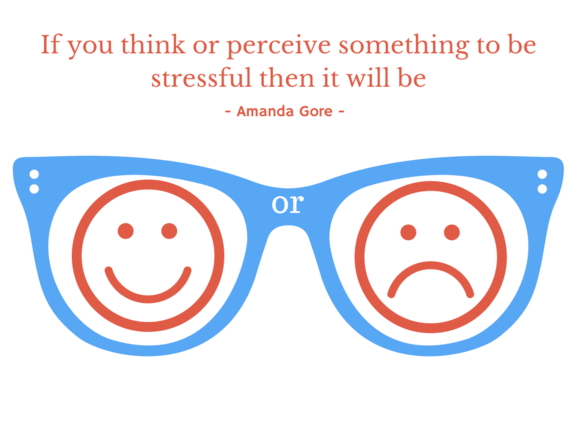Now, the researchers estimated that over the eight years they were tracking deaths, 182,000 Americans died prematurely, not from stress, but from the belief that stress is bad for you. (Laughter) That is over 20,000 deaths a year. Now, if that estimate is correct, that would make believing stress is bad for you the 15th largest cause of death in the United States last year, killing more people than skin cancer, HIV/AIDS and homicide. -- Kelly McGonigal, TED talk
This statement is based on a study that concluded that high amounts of stress affect mental and physical health, and that if you perceive and believe that stress affects your health and feel you have a lot of stress in your life, then you have an increased risk or premature death as well.
So it's time to change our perceptions folks. Humans are experts at perceiving, judging and reacting rather then seeing reality.
Recently, I was told I had a fabulous propensity for creating Greek tragedies in my life. It took me a while to understand what this meant, but finally the message was heard. I realized I was the living embodiment of "why have a crisis, when you can make it a disaster."
It led me to think about what I could do to catch myself before I made an event bigger then Ben Hur and way more stressful than it needed to be.
If we can catch our behaviors before they take hold and become habits, or before we start to track down the same old path again, then we have a choice point. A point where we can change our perception and by doing that -- maybe save our lives.
Our perceptions are just that. Perceptions. Not truth or reality -- it's just the way we view the world based on our past experiences and current beliefs. We are all wearing different spectacles with lenses shaped by our beliefs.
Think of the number of people you have met in your life that you instantly disliked. How many times as you got to know them better did you change your opinion of them -- some of you may be married to one of those people! Why is that? Did they change dramatically? Rarely.
Most often it's because the more you learned about them and saw them for who they really are, the more you realized you have the wrong "first impression" or perception of them. What you told yourself about them initially was wrong. But if anyone at that time tried to change your mind, it may not have worked.
So what is your habit in response to something that might not appear to be perfect. If you have a phone call with bad news, do you instantly scream inside "oh no"? Because if you do, you are releasing huge quantities of stress hormones inside your body as your body responds to the panic and tries to protect you.
This is good if you are running away from a saber tooth tiger, but not when you are on the phone!
Try this: The next time you hear something that normally is a big problem for you and your immediate reaction is to inwardly scream "oh no," stop! And instead take a breath (always good for calming stress) in and out and then say "oh, that's interesting." Doing this will create a totally different biochemical reaction inside you. A relatively stress-free and non-harmful reaction.
Consider three women in a house on a hill. They see a big thunderstorm approaching. One lady loves thunder storms -- she is excited and can't wait and is full of "happy" hormones. Another was terrified by one violent storm when she was a little girl and has remained terrified ever since. She watches it approaching with a huge sense of "oh no!" She is full of stress hormones.
The third lady is very pragmatic -- she is not concerned, but she goes about making sure the house is safe and that nothing will be damaged during the storm -- she stays neutral and her body chemistry follows.
It's the same event but perceived very differently. The bad news is that the second lady is likely to be really affecting her health far more than the other two -- especially if this is a habitual pattern of response for her.
What is your pattern? Become aware of how you view the world -- your perceptions, beliefs and the stories you tell yourself about things. It's really a fairy story -- and we can all rewrite our own fairy stories.
We all need some stimulation to stay alive and find life exciting. Choose to see challenges in your life as exciting opportunities to learn, grow and develop. Perceiving situations this way may help you live longer, and everyone else will be glad you did!
Amanda Gore (www.amandagore.com) is an author, award-winning motivational speaker and joy facilitator! Her philosophy is that Joy is an Inside Job. Finding joy is the secret to more productive, creative, successful and happy humans -- at work and home. Amanda is also the director of The Joy Project. To book Amanda for your event click here or email admin@amandagore.com. Connect with Amanda on Facebook - The Joy Project page

